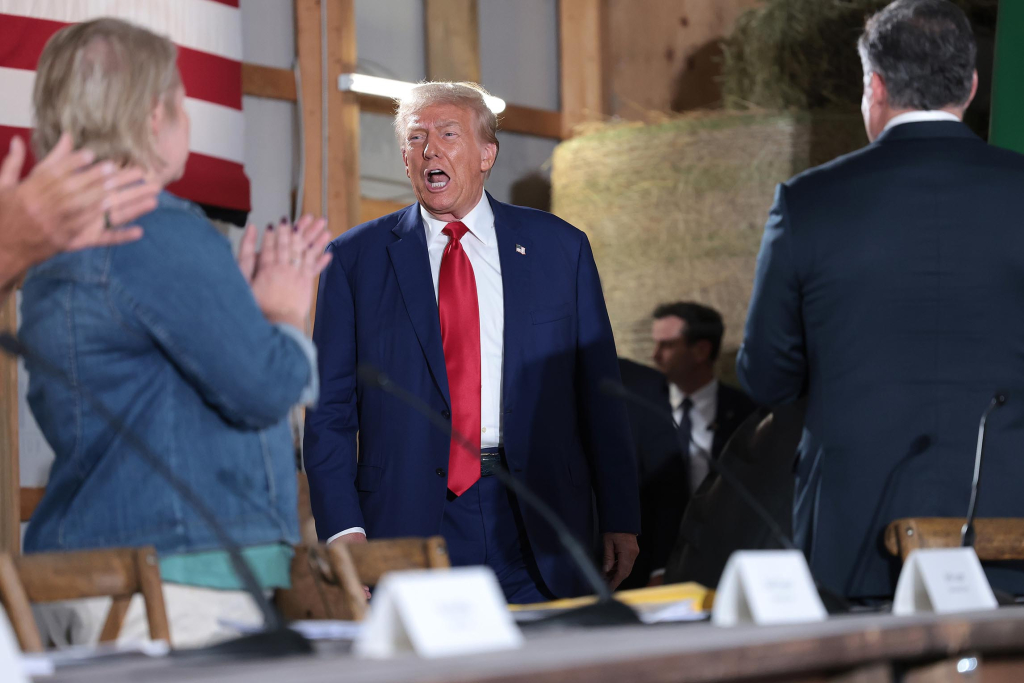By ADRIANA GOMEZ LICON and WILL WEISSERT Associated Press
SMITHTON, Pa. (AP) — Donald Trump sat in a large barn in rural Pennsylvania on Monday, asking questions of farmers and offering jokes, but, in a rarity for his campaign events, mostly listening.
The bombastic former president was unusually restrained at an event about China’s influence on the U.S. economy, a roundtable during which farmers and manufacturers expressed concerns about losing their way of life. Behind Trump were large green tractors and a sign declaring “Protect our food from China.”
The event in Smithton, Pennsylvania, gave Trump a chance to drive his economic message against Vice President Kamala Harris, arguing that imposing tariffs and boosting energy production will lower costs. He highlighted Harris’ reversal of a previous vow to ban fracking, a method of producing natural gas key to Pennsylvania’s economy.
And he noted the tractors behind him were manufactured by John Deere, which announced in June it was moving skid steer and track loader manufacturing to Mexico and working to acquire land there for a new factory. Trump threatened the firm with a 200% tariff should he win back the presidency and it opted to export manufacturing to Mexico.
“If they want to build in the United States, there’s no tariff,” he added.
Trump opened the event with some of his usual themes. He declared that in 2020, “We had an election that didn’t exactly work out too good. And it was a disgrace.”
But he then did something unusual: He let others do most of the talking.
When one farmer said recent decades had seen scores of family farms shut down, Trump asked what that meant for overall production. The response was that, thanks to larger farms now operating, total production is actually up but “we are losing the small family farms.”
“I know that, yes,” Trump responded somberly. Later, he said, “I am not too worried about the people around this table” supporting him on Election Day, while jokingly adding, “But you never know.”
In response to another participant’s concerns about energy production, Trump said he didn’t know that farmers were so energy-dependent. Another farmer talked about Chinese-subsidized businesses, prompting Trump to respond, “That’s why we need tariffs.”
When the same farmer finished her comments by praising him profusely, he intoned, “Amen. I agree.”
Trump has embraced tariffs as he tries to appeal to working-class voters who oppose free-trade deals and the outsourcing of factories and jobs, and the event wasn’t all about showing a more personable side.
Later the former president took questions from reporters and got more customarily combative when asked whether he was concerned that tariffs on manufacturers like John Deere would increase costs for farmers. He said of Harris, “She is not going to be good for Pennsylvania.”
Later Monday, Trump is holding a rally in Indiana, Pennsylvania, where he is hoping conservative, white working-class voters help him pull ahead of Harris, who herself is visiting Pennsylvania on Wednesday.
“Despite all his lies and pandering, Donald Trump used the White House to give handouts to wealthy corporations and foreign companies at the expense of family farmers, drive farm bankruptcies to record levels, and sacrifice small American farmers as pawns in his failed trade war with China,” Harris campaign spokesman Joseph Costello said in a statement.
Monday’s farming event was hosted by the Protecting America Initiative, led by Richard Grenell, Trump’s former acting director of national intelligence, and former New York congressman Lee Zeldin. Grenell said, “China is getting into our farmlands, and we have to be able to see China very clearly.”
At the end of 2022, China held nearly 250,000 acres of U.S. land, which is slightly less than 1% of foreign-held acres, according to the U.S. Department of Agriculture. By comparison, Canada was the largest foreign owner of U.S. land, accounting for 32%, or 14.2 million acres.
Still, the National Agricultural Law Center estimates that 24 states ban or limit foreigners without residency and foreign businesses or governments from owning private farmland. The issue emerged after a Chinese billionaire bought more than 130,000 acres near a U.S. Air Force base in Texas and another Chinese company sought to build a corn plant near an Air Force base in North Dakota.
Rex Murphy, from a nearby rural community who raises cattle and grows corn and hay, said farmers support Trump in this area, and said he wanted fewer taxes and “more freedom.”
“I want him to do everything for the economy,” said Murphy, 48. “If he just becomes president, and he does what he does, he will do more.”
__
Weissert reported from Washington. Associated Press writer Didi Tang in Washington contributed to this report.




